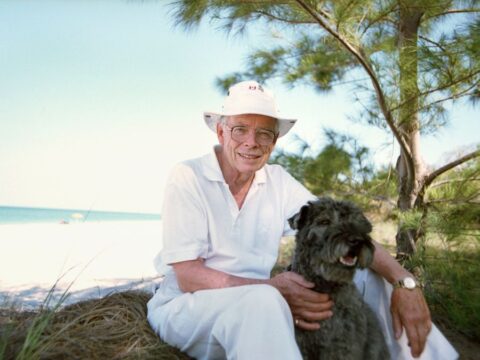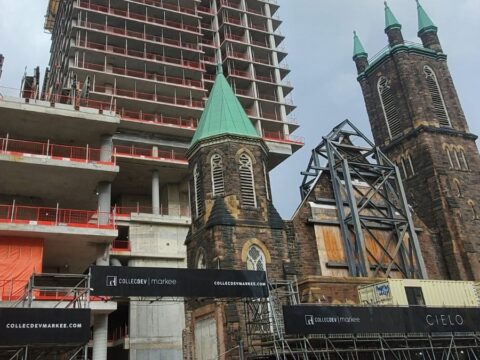West Hill United in Toronto’s Scarborough neighbourhood is no stranger to new ideas. In 2001, its minister, Rev. Gretta Vosper, made headlines when she declared herself an atheist, leading the way for the church to become a values-based community where everyone is welcome regardless of their faith. And as West Hill celebrated its 75th anniversary this year, it transcended expectations even more by getting rid of a minister altogether.
An executive director now leads the congregation instead of a member of the clergy. Joe Pittenger assumed the position earlier this year after Vosper retired in 2024. Pittenger is a Humanist chaplain who lives in Ohio and holds a master’s in practical theology and an MBA.
You may unsubscribe from any of our newsletters at any time.
While this new role shares many similarities with that of a traditional minister—such as leading sermons, or what West Hill calls “perspectives,” where the community explores questions and applies them to their lives together — it also incorporates marketing responsibilities. This change is both semantic and practical. By bringing on a secular leader, the congregation hopes to become more appealing to new members, while better reflecting the flat organizational structure of West Hill. Congregant and communications director Aaron Sheedy said having a minister felt too hierarchical.
“How can we be the most inclusive that we can? And that includes not limiting people’s experiences with us to things like, you must believe in God, or you must be able to [be at a] certain income level, or you must be in a country. We’re really breaking all that down. And in order to continue to break that down, the role of minister started to become divisive for us,” he said.
That flat structure is central to how the congregation operates. As Sheedy explains, “you will be hard pressed to find somebody at West Hill who isn’t or hasn’t been a part of leadership in the past.”

West Hill is also hybrid — online and in person — which allows people from all over the world to actively participate in the life of the congregation and even hold board member positions while being overseas. Sheedy estimates that about 100 people are part of West Hill online and in person. The congregation is now split roughly equally between its online members and in-person attendees, with people switching back-and-forth if they live nearby. Even Pittenger himself occasionally tunes in on Sundays over Zoom. This approach aligns with one of his goals to “build teams of people where the community looks after each other’s needs.”
More on Broadview:
- Brampton threatens legal action against church supporting vulnerable residents
- Why churchgoers should question every text message
- New United Church Moderator Kimberly Heath on her vision for the denomination
The rebrand, which includes Pittenger’s hiring and a new logo, also stems from a desire to share West Hill’s vision with as many people as possible. “Right now, we have a loneliness epidemic,” says Pittenger. “People need to connect and wrestle with life’s biggest questions together.” The rebrand, he adds, is also a way “to market our product, because we believe what we do is extremely valuable.”
Looking ahead, West Hill is considering other new additions to its core staff, such as a community care coordinator who will provide pastoral care. While nothing has been finalized, Sheedy and Pittenger say they are open to candidates from non-ministry backgrounds, such as nursing or counselling.
Pittenger says he thinks that society needs more places like West Hill.
“I do think that we need more values-based communities because unfortunately, sometimes doctrine can divide…. And if someone believes in God, I say, ‘incredible, that’s great. Is that helping you live a more loving, truthful, just life?’ And if somebody doesn’t, I just don’t even say that’s okay. I say, ‘that’s great. Thank you for your honesty, you know? Are you aiming to live a loving, just life?’”
***
Evgenia Shestunova is a writer in Toronto.














I agree there is a place for this, but it is not within the United Church of Canada. I’ve experienced churches that honour the historical Jesus but are not so sure about God, and churches that honour God but are not so sure about Jesus. The United Church can find room for these. But this is different…
I miss WHUC. All my life since I’ve been going there no matter where I have lived I have never found a place that is as warm and accepting as West Hill. It has been years since I have been there and I miss Gretta so much! God bless you all and be at peace always. Still looking for that new church home cuz now I live in Whitby. I hope I can find one that held my heart like West Hill did.
As a layperson with some experience, I occasionally took the pulpit in my church. In my personal faith journey, I was struggling with the sacrament of communion, so I did not participate lately. I was told that if I couldn’t agree with the tenets of the UCC, I should find another church. Perhaps this one will take me.
I recall when the United Church was a leader in left of centre politics. There are some tenets of The United Church I don’t agree with today and even some I’m downright disgusted with. But…I’m retired so it doesn’t really matter what my opinion is. My main point is: do you have a relationship with God as you know Got to be for you? And, does it work for you? If so, you don’t really need a church but if you feel better praying with a group then by all means find one that accepts you as a spiritual person and not as one who just goes through the motions. Time to move on.
You poor lost souls.
You don’t need a church. You need CHRIST. Unless you’re born again in the Spirit of God you are NOT Christian nor anything close to being one.
Where do you thibk “values” come from if not an Almighty transcendent Creator.?
What will be the United Church’s response to this change? Although much of what Greta believed and taught may have been beyond the theology of the United Church, but at least as I understand it, there was still a modicum of “church” there. With this new structure of Executive Director who doesn’t really care whether one is a person of faith or not, I question how the congregation can expect to stay in the United Church umbrella. None of us believe in the old-man-in-the-sky god, but still there is a sense of Presence, sacredness, and devotion that points to and embraces something bigger than us. Jesus was one who lived that reality and called others to walk his way. Thus they were called People of the Way. If West Hill as a congregation no longer follows the Way (regardless of individual theology and beliefs), then should they continue to call themselves a Christian congregation? Will they continue in the UCC fold?
I agree with Dawn. ⁹ Sounds like compassionate community centre to me – not a church.
Good question!
I know, right? These people ought to heed Jesus’ words: “Come unto me, all ye who labor and are heavy laden, and I will give you rest.” (Matthew 11:28). God beckons in Revelation 3:20: “Behold, I stand at the door, and knock: if any man hear my voice, and open the door, I will come in to him, and will sup with him, and he with me.” At West Hill though, people gather without the Lord, but instead they self-edify.
In Canada, we are free to hold whatever belief we choose. Christianity, Atheism, Judaism, Islam, and everything else under the sun is legal and accepted. But there is a difference between the state and the church tolerating non-Christian belief. For the church to allow complete denial of our own faith is not tolerance, it is to stop being a church at all. The UCC is a proudly progressive Christian denomination, but surely the “Christian” part is more important than the “progressive” part, right?
West Hill isn’t a church. It is a business enterprise that has no business in a church which espouses Following Jesus. It is in complete antithesis to what the United Church claims to be in its most recent creed. I also find it interesting that this church uses the language of business for its leader. A CEO does not belong in a church. I think it is time to cut West Hill from the United Church of Canada. Let it be its own entity. I also find it amusing that the CEO is an American trained person. It worries me that this situation could easily be repeated across the church where finding ministers has become a real challenge. In fact I have heard some say that ordained clergy are no longer needed. If this trend continues I will find another denomination that follows the teachings of Jesus and still believes in the concept of a Holy mystery we have been calling God.